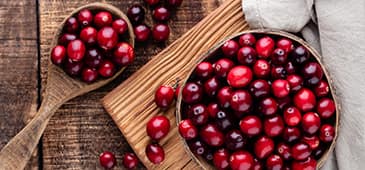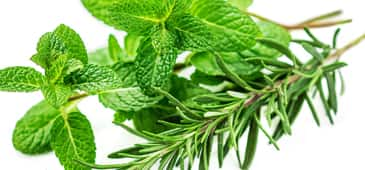
What's Hot
What's Hot
News flashes are posted here frequently to keep you up-to-date with the latest advances in health and longevity. We have an unparalleled track record of breaking stories about life extension advances.
- Vitamin D mechanisms against allergic asthma explored
- Choline may benefit frail, hypertensive individuals
- Vitamin D improves response to cancer immunotherapy
- Cranberries a winner against UTI
- Vitamin deficiency could explain African Americans’ greater risk of aggressive prostate cancer
- How diet may help protect against effects of insufficient sleep
- Meta-analysis affirms curcumin benefit in MAFLD
- Joint hypermobility linked to folate deficiency
- Study suggests brain age reversal
- Diet, lifestyle regimen associated with reversal of biologic age
- Amino acid plus metformin prevents cellular senescence
- Rosemary, peppermint oils enhance memory in rodent model of Alzheimer's disease
Vitamin D mechanisms against allergic asthma explored
April 28 2023. Research findings reported March 24, 2023, in the Journal of Allergy and Clinical Immunology provide new information concerning how vitamin D benefits people with allergic asthma.
“Vitamin D3 is known to have immunomodulatory functions, and vitamin D3 deficiency is associated with more severe asthma,” authors Janina C. Grund of Universitätsklinikum Erlangen in Germany and colleagues wrote. “The mechanism by which vitamin D3 might modulate the immune response in patients with asthma requires further investigation.”
In the current investigation, Dr Grund and colleagues analyzed data from a study that included healthy preschool children and preschool children with asthma as well as another study that included adults with asthma and healthy control participants. They observed that asthma patients who used vitamin D3 supplements had better controlled and less severe asthma, and a lower need for inhalable steroid medication. In nonasthmatic children, higher serum levels of vitamin D3 were associated with greater expression of the protein Blimp-1. Blimp-1 is a transcription factor necessary for the production of the anti-inflammatory immune system protein interleukin-10 in immune cells known as regulatory T cells.
In mice in which allergic asthma was induced, vitamin D supplementation was associated with less severe asthma, a reduction in IgE antibodies that are elevated in some allergic diseases and an anti-inflammatory immune response as indicated by increased interleukin-10.
“Supplementing vitamin D3 resulted in amelioration of clinical asthma manifestations in human studies as well as in experimental allergic asthma, indicating that vitamin D3 shifts proinflammatory immune responses to anti-inflammatory immune responses via upregulating Blimp-1 in lung innate lymphoid cells and tissue-resident memory cells,” the authors concluded. “Our findings underline the importance of sufficient vitamin D3 serum levels in asthma patients and provide a new perspective on the immunoregulatory role of vitamin D3 in allergic asthma.”
—D Dye
Choline may benefit frail, hypertensive individuals
April 26 2023. A study reported April 18, 2023, in the European Journal of Preventive Cardiology found improvement in cognitive performance among frail men and women with high blood pressure who consumed choline supplements.
The study included 51 frail patients with primary hypertension who were over the age of 65. Frailty, characterized in this study by weakness, slowness, low activity, exhaustion and weight loss, is often observed in older individuals with high blood pressure. Both frailty and hypertension increase the risk of cognitive impairment. Participants in the study had cognitive function scores that were below normal at enrollment.
Twenty-six participants were given 1200 milligrams per day alpha- glycerylphosphorylcholine (alpha-GPC) and 25 control participants received no treatment for six months. At the end of the study, cognitive function scores were higher among participants who received alpha-GPC compared with the beginning of the study and compared with the control group.
The researchers additionally conducted experiments to evaluate the effect of alpha-GPC on the function of endothelial cells that line the blood vessels. (Endothelial dysfunction contributes to hypertension.) They found that the administration of alpha-GPC for 24 hours reduced cellular senescence induced by angiotensin II (Ang II), the main active form of the hormone angiotensin, which increases blood pressure. (Cellular senescence is a process in which cells age and stop dividing, but do not die.) Authors Pasquale Mone, MD, and colleagues remarked that low-dose chronic administration of angiotensin II had been recently found in mice to induce cellular senescence in kidney endothelial cells.
“This is the first study demonstrating the favorable effects of α-GPC on cognitive dysfunction in frail hypertensive older adults, also showing that α-GPC significantly attenuates Ang II-induced endothelial dysfunction,” they announced. “These findings are relevant especially considering the previously reported fundamental role of Ang II in the pathophysiology of cognitive impairment and vascular senescence.”
—D Dye
Vitamin D improves response to cancer immunotherapy
April 24 2023. Results of a study reported on April 24, 2023, in the American Cancer Society journal Cancer revealed a benefit for vitamin D among individuals receiving anti-PD-1 immunotherapy for melanoma, a potentially deadly variety of skin cancer.
The study included 199 advanced melanoma patients who received first-line treatment with a type of immunotherapy known as an immune checkpoint inhibitor. This form of immunotherapy targets immune checkpoints such as PD-1 that prevent immune cells called T cells from attacking cancer cells.
Patients’ vitamin D levels were assessed before and every 12 weeks during treatment. Among patients who had normal vitamin D levels with or without vitamin D supplementation, 56% showed a favorable response rate to immunotherapy. In contrast, a favorable response occurred in only 36.2% of those whose vitamin D levels were low and who did not use vitamin D.
Among patients with normal vitamin D levels, the time from beginning immunotherapy until cancer progression a was nearly double that of patients with lower levels. Patients with normal vitamin D survived an average of 31.5 months compared with 27 months for those with low vitamin D concentrations. “In our opinion, maintaining the vitamin D level within the normal range during anti-PD-1 immunotherapy in advanced melanoma patients should be a standard procedure allowing the improvement of treatment outcomes,” the authors concluded.
“Of course, vitamin D is not itself an anti-cancer drug, but its normal serum level is needed for the proper functioning of the immune system, including the response that anti-cancer drugs like immune checkpoint inhibitors affect,” lead author Łukasz Galus, MD, of Poznan University of Medical Sciences commented. “In our opinion, after appropriately randomized confirmation of our results, the assessment of vitamin D levels and its supplementation could be considered in the management of melanoma.”
—D Dye
Cranberries a winner against UTI
April 21 2023. Cranberry juice or cranberry extract have long been touted as being protective against urinary tract infection (UTI). A review published in the Cochrane Database of Systematic Reviews on April 17, 2023, concluded that there is significant evidence that cranberries reduce the risk of these infections in comparison with a placebo or no specific treatment.
The current review updated previous reviews published in the Cochrane Library that evaluated the association between cranberry supplementation and UTIs. By including 26 new trials in the latest review, Dr Gabrielle Williams and colleagues increased the total number to 50 trials that compared the effects of cranberry to a placebo, no specific treatment, or treatment with antibiotics or probiotics. The 50 trials included a total of 8,857 participants.
Of 26 trials that compared the effects of cranberries to a placebo or no specific treatment on the outcome of culture-verified UTIs, cranberry reduced the risk of UTIs by 30%. Among eight trials that included women with recurrent UTIs, those that received cranberry products had a 36% reduction; in the five studies that involved children, UTI risk was lowered by 54% and among the six studies that included participants with a susceptibility to UTI, the risk was lowered by 53%.
"This incredible result didn't really surprise us, as we're taught that when there's more and better evidence, the truth will ultimately come out," Dr Williams stated."Even back in 1973, my mum was told to try cranberry juice to prevent her horrible and frequent UTIs, and for her it's been a savior."
"Despite me niggling in her ear about evidence, she's continued to take it daily, first as the nasty sour juice and in recent years, the easy to swallow capsules," she added. "As usual, it turns out that mum was right!"
—D Dye
Vitamin deficiency could explain African Americans’ greater risk of aggressive prostate cancer
April 19 2023. Research findings reported April 18, 2023, in Cancer Research Communications suggest that insufficient vitamin D levels could be responsible for the higher incidence of aggressive prostate cancer experienced at a younger age by African American men.
“African American men are more likely than European American men to develop prostate cancer and are twice as likely to die from the disease,” senior author Moray Campbell, PhD, of Cedars-Sinai Cancer explained. “Large-scale studies have shown that differences in access to healthcare do not fully account for this health disparity, and our study identifies biological factors that might explain it.”
He elaborated that Africans have retained more melanin in their skin to protect against the sun’s rays; however, this reduces the amount of vitamin D manufactured in ultraviolet light-exposed skin. “Because of this, their descendants in the U.S., which receives fewer hours per year of bright sunshine than African countries do, are often vitamin D deficient.”
Cancer cells fail to mature and die as normal cells do and, instead, continue to divide. “Without sufficient levels of vitamin D to cause them to mature, the cells in a tumor continue to multiply out of control,” Dr Campbell noted.
The research team discovered that a protein known as the vitamin D receptor appears to have adapted differently in individuals of African ancestry than in those of European ancestry. Comparison of prostate cancer cells derived from men of African and European ancestry revealed differences in their reaction to vitamin D exposure. “Their response to vitamin D was very, very different, including which genes the vitamin D receptor was controlling and the magnitude of that control,” Dr Campbell reported. “In African American men, this differing response made them more vulnerable to prostate cancer.”
—D Dye
How diet may help protect against effects of insufficient sleep
April 17 2023. In an interview with Harvard Medicine News published April 11, 2023, neurobiologist Dragana Rogulja discussed her findings in the understanding of sleep, including a protective role for antioxidants against the effects of sleep deprivation.
Dr Rogulja is the coauthor of articles published in the June 11, 2020, and March 30, 2023, issues of Cell.
“We saw a correlation where the more sleep the flies lost, the faster they died,” she reported concerning the earlier research. “There seemed to be an inflection point where sleep loss was associated with death, which told us that there might be something specific happening in the body as opposed to general wear and tear.”
“In the gut, there was an increase in oxidizing molecules, and the peak of oxidation correlated with the inflection point where the flies started to die,” she explained. “We confirmed this finding in sleep-deprived mice. But when we gave sleep-deprived flies antioxidants or turned on antioxidant-producing genes in the gut, we found the flies could survive on little or no sleep, suggesting that the gut is a really important target of sleep.”
Dr Rogulja and colleagues concluded that oxidative stress may be a culprit behind mortality associated with severe sleep restriction and that survival is enhanced by preventing reactive oxygen species accumulation.
In the 2023 article, they reported that a protein-rich diet enabled flies and mice to sleep more deeply. They determined that a higher protein concentration in the digestive tract affects a group of neurons in the brain that regulate the responsiveness of animals to certain stimuli that could awaken them. “Our study implies that dietary choices impact sleep quality,” Dr Rogulja concluded. “Now we can explore this connection in humans to understand how diet could be manipulated to improve sleep.”
—D Dye
Meta-analysis affirms curcumin benefit in MAFLD
April 14 2023. An umbrella review and updated meta-analysis of studies that evaluated the effects of curcumin in people with metabolic dysfunction-associated fatty liver disease (MAFLD) adds evidence to the benefits of curcumin supplementation in this population. The findings were published April 10, 2023, in the journal Scientific Reports.
“Given improved understanding of the pathogenesis of NAFLD [nonalcoholic fatty liver disease], an international panel of experts has proposed new terminology around the term metabolic dysfunction-associated fatty liver disease (MAFLD), which is based on evidence of hepatic steatosis, along with one or more of the following conditions: obesity/overweight, type 2 diabetes, or laboratory results representing metabolic dysregulation,” Thitiya Lukkunaprasit, PhD, of Rangsit University and colleagues explained.
For the updated meta-analysis, the research team analyzed 16 randomized, controlled trials that compared the effects of curcumin extracts or turmeric to a placebo or standard treatment among men and women with MAFLD. Analysis of the data from the 15 trials that reported curcumin’s effect on the liver enzyme aspartate aminotransferase (AST) revealed a significant reduction in association with curcumin, which was stronger for bioavailability-enhanced forms. For the 14 trials that evaluated the effect of curcumin on the enzyme alanine aminotransferase (ALT), supplementation was also significantly associated with a reduction. These enzymes are elevated in the blood of people with liver diseases.
Significant improvement in liver fat as determined by ultrasonography, and lower fasting blood glucose, body mass index and total cholesterol were associated with curcumin supplementation in studies that assessed these factors.
An umbrella review of six systematic reviews and meta-analyses found significant reductions in AST in three reviews and decreases in ALT in two.
“Our comprehensive review provides support for the positive effects of curcumin on slowing the progression of MAFLD,” Dr Lukkunaprasit and colleagues concluded.
—D Dye
Joint hypermobility linked to folate deficiency
April 12 2023. The April 2023 issue of the journal Heliyon reported a link between excessively flexible joints (sometimes referred to as “double-jointedness”) and deficient levels of the B vitamin folate. Joint hypermobility characterizes a type of Ehlers-Danlos syndrome (EDS, a group of 13 connective tissue disorders) and comprises the majority of EDS cases.
“You’ve got millions of people that likely have this, and until now, there’s been no known cause we’ve known to treat,” commented corresponding author Gregory Bix, MD, PhD, who is the director of the Tulane University Clinical Neuroscience Research Center. “It’s a big deal.”
Folate deficiency can occur when people have a variant of the MTHFR gene that prevents them from metabolizing the vitamin. Having an insufficient amount of folate could prevent certain proteins from binding collagen to the extracellular matrix, leading to tissue that is more elastic, joints that are hypermobile and a range of associated adverse effects.
In the current research, the team observed a correlation between elevation in serum folate levels (indicating unmetabolized folate) and MTHFR variations in hypermobile patients. They speculated that supplementation with MTHFR’s end product, 5-methyltetrahydrofolate, could lessen the impact and progression of hypermobility's effects. “It’s an innocuous treatment,” Dr Bix stated. “It’s not dangerous, and it’s a vitamin that can improve people’s lives. That’s the biggest thing: We know what’s going on here, and we can treat it.”
“Hypermobility is widespread and unfortunately under-recognized,” noted first author Jacques L. Courseault, MD, who is the medical director of the Tulane Fascia Institute and Treatment Center. “I’m excited about being able to treat the masses where people aren’t going their whole lives being frustrated and not getting the treatment they need."
“This is real, it’s been vetted out well and clinically we’re noticing a difference,” he added.
—D Dye
Study suggests brain age reversal
April 10 2023. The March 2023 issue of Brain Sciences revealed a reversal of biologic brain aging among men and women who participated in a nutritional program for an average of 13 months.
“There is a growing consensus that chronological age is not an accurate indicator of the aging process and that biological age instead is a better measure of an individual’s risk of age-related outcomes and a more accurate predictor of mortality than actual chronological age,” Andrew A. Fingelkurts and Alexander A. Fingelkurts noted. “In this context, biological age measures the ‘true’ age, which is an integrated result of an individual’s level of damage accumulation across all levels of biological organization, along with preserved resources. The biological age is plastic and depends upon epigenetics.”
The study included 47 men and women who were assigned lifestyle changes and 42 participants who were assigned an individually tailored program that included, but was not limited to, vitamins A, B complex, C and D, alpha-lipoic acid, coenzyme Q0, magnesium, omega-3 fatty acids, zinc, and Bifidobacterium and Lactobacillus probiotics. Brain biologic age was assessed with electroencephalography before and after the intervention.
Brain biologic age was younger than chronological age (calendar years lived) at the end of the study in both groups. Participants who consumed the nutrients had a brain biologic age that averaged 2.83 years younger than the age measured at the beginning of the intervention, while those in the lifestyle group had a brain age that was 0.02 years younger.
“The present study demonstrated that brain biologic age deceleration, and even reversal, with accompanying improvements in mental–physical health comorbidities is possible in humans using accessible interventions, such as lifestyle changes or nutraceutical supplementation, within a practical time frame (approximately 13 months),” the authors concluded.
—D Dye
Diet, lifestyle regimen associated with reversal of biologic age
April 7 2023. A case series published in the March 31, 2023 issue of Aging reported an age-reversal benefit following eight weeks of a methylation-supportive diet among a group of six women.
Methylation is a process in which a molecule known as a methyl group becomes attached to proteins, DNA or other molecules. Undermethylation can result in high levels of homocysteine, which are associated with cardiovascular disease and other conditions.
The researchers analyzed the participants’ biologic age before and after the diet program. Biologic age in this study was assessed by evaluation of DNA methylation, while chronologic age refers to the number of years a person has lived.
Daily foods included in the intervention were dark leafy greens, cruciferous vegetables, colorful vegetables, pumpkin seeds, sunflower seeds, beets, methylation adaptogens (berries, rosemary, turmeric, garlic, green tea or oolong tea), animal protein, healthy oils, and lactobacilli probiotic and greens powder supplements. Three servings of liver and five to ten eggs were recommended per week. The daily lifestyle program consisted of exercise, seven hours of sleep, fasting, water recommendations and breathing exercises.
All but one of the women (whose biologic age remained the same) experienced reductions in biologic age in comparison with measurements obtained prior to the program, with individual decreases of 11.01, 4.07, 7.4, 1.22 and 3.94 years. All participants ended the program with biologic ages that were lower than their chronologic age.
“The findings of this case series add to the existing evidence suggesting that widely-accessible, cost-effective dietary and lifestyle interventions, that are designed to support DNA methylation and are widely considered to be safe, may be able to reduce measures of biological aging and have the potential to impact healthspan, lifespan, and the economic burden of aging,” authors Kara N. Fitzgerald and colleagues concluded.
—D Dye
Amino acid plus metformin prevents cellular senescence
April 5 2023. The cover story of the March 31, 2023, issue of the journal Aging documents an ability for the diabetes drug metformin and the essential branched-chain amino acid leucine to help remove senescent cells in muscle tissue.
"Aging coincides with the accumulation of senescent cells within skeletal muscle that produce inflammatory products, known as the senescence-associated secretory phenotype, but the relationship of senescent cells to muscle atrophy is unclear," Jonathan J. Petrocelli and colleagues at the University of Utah wrote. "Previously, we found that a metformin + leucine treatment had synergistic effects in aged mice to improve skeletal muscle structure and function during disuse atrophy. Therefore, the study's purpose was to determine the mechanisms by which metformin + leucine exhibits muscle atrophy protection in vitro and if this occurs through cellular senescence."
Muscle atrophy is a loss of muscle tissue and strength that occurs during disuse or aging. Cellular senescence occurs when cells become aged and stop dividing. Instead of self-destructing, senescent cells remain in the tissues and secrete damaging proinflammatory compounds, which may increase the risk of cancer or other diseases.
The current research determined that metformin plus leucine increased development and prevented atrophy of myotubes, which are formed during a stage of muscle fiber development. Genetic pathways related to inflammation and cellular senescence that were increased following myotube atrophy were reversed by the metformin plus leucine combination. Treatment with the senolytic combination dasatinib plus the flavonoid quercetin, which has previously been found to induce the death of senescent cells, prevented myotube atrophy similarly to metformin plus leucine.
The study showed that metformin and leucine prevented skeletal muscle cellular senescence and inflammation and prevent myotube atrophy. This mechanism could be utilized to help reverse muscle loss that occurs during aging.
—D Dye
Rosemary, peppermint oils enhance memory in rodent model of Alzheimer's disease
April 3 2023. A study published March 22, 2023, in Nutrients found improvement in memory and an increase in a marker of neurogenesis (the formation of new neurons) in rats with a condition similar to Alzheimer's disease that received extracts of rosemary and/or peppermint oil.
The study included groups of rats that received a low or high two dose of rosemary oil extract, a low or high two dose of peppermint oil extract, a low dose mixture of rosemary and peppermint oil extracts or a high dose mixture of the extracts. Control groups of rats received saline, scopolamine (a drug that induces memory loss) with no other treatment, or scopolamine and the drug donepezil, which is prescribed for dementia related to Alzheimer's disease.
Rats that received the oils showed improvement in tests of memory compared with saline-treated animals. When the oil-treated rats were also treated with scopolamine, memory processing was better than animals that received scopolamine plus donepezil. Rats treated with rosemary and peppermint oils also showed an increase in hippocampal levels of brain derived neurotrophic factor (BDNF, a protein that helps prevent the death of brain cells and induces new neuron growth) in the hippocampus, an area involved in memory and learning. While it was found that scopolamine suppressed the growth of new neurons in the hippocampus, this improved in groups that received both oil extracts.
"Our results showed that both oils seem to enhance the performance of both working and spatial memory," the authors concluded. "The combination of both oils produced a potential synergistic activity as anti-amnesic agents compared to single oils."
"This research was accomplished by using a scopolamine-induced dementia-like Alzheimer's disease rat model," they noted. "Future work needs to concentrate on human clinical trials to investigate the reported effects of these oil extracts in Alzheimer's disease and cognitive dysfunction disorders."
—D Dye

 April 28 2023. Research findings reported March 24, 2023, in the
April 28 2023. Research findings reported March 24, 2023, in the  April 26 2023. A study reported April 18, 2023, in the
April 26 2023. A study reported April 18, 2023, in the  April 24 2023. Results of a study reported on April 24, 2023, in the American Cancer Society journal
April 24 2023. Results of a study reported on April 24, 2023, in the American Cancer Society journal  April 21 2023. Cranberry juice or cranberry extract have long been touted as being protective against
April 21 2023. Cranberry juice or cranberry extract have long been touted as being protective against  April 19 2023. Research findings reported April 18, 2023, in
April 19 2023. Research findings reported April 18, 2023, in  April 17 2023. In an interview with
April 17 2023. In an interview with  April 14 2023. An umbrella review and updated meta-analysis of studies that evaluated the effects of curcumin in people with metabolic dysfunction-associated
April 14 2023. An umbrella review and updated meta-analysis of studies that evaluated the effects of curcumin in people with metabolic dysfunction-associated  April 12 2023. The April 2023 issue of the journal
April 12 2023. The April 2023 issue of the journal  April 10 2023. The March 2023 issue of
April 10 2023. The March 2023 issue of  April 7 2023. A case series published in the March 31, 2023 issue of
April 7 2023. A case series published in the March 31, 2023 issue of  April 5 2023. The cover story of the March 31, 2023, issue of the journal
April 5 2023. The cover story of the March 31, 2023, issue of the journal  April 3 2023. A study published March 22, 2023, in
April 3 2023. A study published March 22, 2023, in 